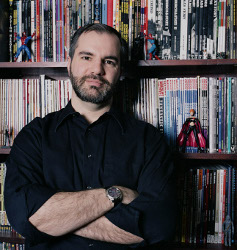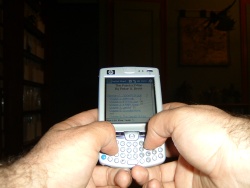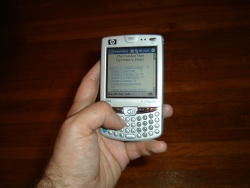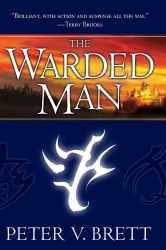Novelist Pens First Book on Smart Phone; Succeeds In Making Us Look Like Slackers
Sign up to receive The Snapshot, a free special dispatch from Laptop Mag, in your inbox.
You are now subscribed
Your newsletter sign-up was successful
It's amazing what a person can do with a dream, plenty of determination, and a reliable piece of mobile technology. Author Peter V. Brett recently came to our attention after we stumbled upon a New York Daily News article that detailed how he crafted a significant portion of his debut epic fantasy novel, The Warded Man, while riding the subway on his way to work. The tools that he used to transcode his imagination into words weren't the pen and pad, but a number of different smart phones. Amazed, we tracked down Mr. Brett to discuss the importance of mobile technology in his career, why the iPhone just couldn't cut it for him, and why the Amazon Kindle will prove to be both a blessing and a curse. LAPTOP: How long have you been writing professionally? Peter Brett: I sold my first book in 2007 and kept my day job until the end of 2007. I’d been writing as a hobbyist my whole life. I wrote my first book in high school—it was crap. I wrote it on an old IBM PC Junior and it was a horrible thing I wouldn’t want anyone to read, but I learned a lot. In college, I traded up in computers and I wrote another book. After college I wrote yet another one. The one that I sold, The Warded Man, is my fourth book. Each time, as I got better and better at writing, technology has been leaping ahead. Things that used to be long, tedious tasks, such as handwriting a book and then keying it in , and then fixing all of your errors—you don’t have to do that as you become more and more mobile.
L: What inspired you to begin writing your novel on a smart phone? PB: When you have a full time job and writing as hobby, you need to practice on a regular basis. When I realized that I had a shot at writing professionally, I started looking for ways to write down ideas in my otherwise unproductive times--when I’m out of the house and away from my computer. At that point I was shackled to my computer as I hate writing by hand. So, I would be out and about, but had nowhere to write. I got a Palm Pilot and began writing with a stylus in its chicken scratch language to take notes, and I actually got quite fast with it. It was imperfect, but I liked that I could plug it into a computer, sync it with Microsoft Word, and then continue to write on the computer. In late 2005, HP came out with the iPAQ smartphone 6515 with Windows Mobile which did the same thing as the Palm Pilot, but had a full keyboard so you didn’t have to write with the stylus—you could just type. I thought it was the greatest thing ever and bought it right away. As I got faster and faster typing with my thumbs, I wound up just writing prose on it. After doing that for a while, and realizing I could do it from anywhere, I made a commitment to myself to write on the train everyday.
L: What was your commute time to work? PB: About 45 minutes. I worked in Times Square. I’d get on at the Fort Hamilton stop, take the F train to 42nd St, walk two blocks. Once I’d started writing on the train, I’d keep doing so even after I got off and was walking to work. L: How was it possible to write in the subway? It must have been quite difficult with the sea of people. PB: In order to write effectively, you need two hands. If you’re on the subway, and you're standing, you need one hand to brace yourself. Sometimes, if it wasn’t too crowded, I’d wrap my arm around the pole so that I could hold on with my elbow and still write. But for the most part I developed my seat hunting skills. There are certain stops on the train where lots of people tend to get on or off. If you pay close attention you can see someone gathering their bags, and you can grab a seat before a new load of people come on. I developed those skills so that I could grab a seat , tune out, and just work. L: How much of the book was written on your smart phone? I did the math once. Early on my publisher asked me that in an interview, and it was about 60 percent. About 100,000 words. But it wasn’t all on the train; sometimes I do it while in the park, or in-line at the bank, or while on a road trip where I’d sit in the passenger seat and just work.
L: Are you using the same smart phone? PB: I used the HP iPaq 6515 until September 2008---about 2.5 years. But it was glitchy. I think that's because it was the first in a new line of phones. It froze up a lot. If I tried to open the entire book , it would freeze up because it was too big a file. So I had to break it into chapters and open a chapter at a time. Then, last September, the HP iPaq 900 came out with way more power, and I’ve been using that ever since. It doesn’t have the glitches, so I’m happy with it. L: I notice that these phones all have physical buttons. PB: Correct. One of the main reasons I never bought the iPhone was that I tried writing with virtual buttons, and it just couldn't keep up with me. It keeps trying to suggest words to you, and it takes more time to register which key you’ve hit, because you’re hitting more than one at a time. The last time I checked, there was no way to sync it to Microsoft Word, and if I can't sync to Word, it's no good to me, as I need to work on my desktop, too. L: Now that you’re writing for a living and are no longer required to make that commute, do you write indoors more? PB: I have a baby in the house. There is no writing [indoors] unless baby is asleep. Today, I went to the park to do writing on my phone. If she's up and running about, there's no way for me to go to that other world and write. I do the fast majority of writing on my desktop—I don’t like writing on laptops. Odd, I know, from someone who writes on a phone. If the Kindle put a word processor on there with that big screen, I would use that full time. I would make that my tool of choice. You can see lots of text at once, it's super portable, and I can carry all of my books. My dream would be to have one of those pads that everyone has on Star Trek. L: As an author, what's your opinion on the Amazon Kindle? PB: I love it and wonder if it’ll be the end of us all. From a technological standpoint, I think its one of the greatest inventions ever. It’s doing for reading, what the iPod did for music. Instead of having to pick and choose what you're going to carry, you can take all of your stuff wherever you are. I love the Kindle on that level. I like the idea of a nice Spartan existence without piles of newspapers or books. I also know that before my book came out in the UK [where it's known as The Painted Man], someone got an advanced release, ripped out the spine, scanned every page, and put it on a pirate site. No one cared because I was a debut author and no one heard of me. But it shows that there's the same level of danger to the publishing industry as there is to the music industry. The Kindle is like the last sign of the Apocalypse for books going digital. L: What do you think can be done to prevent rampant piracy? PB: Right now it doesn’t matter so much. The Kindle is a little expensive and a still a little glitchy. It wont work in the cold—if its below 40 degrees, it stops working. There's a little time for the publishing industry to position itself. It needs to look at the mistakes that the music industry has made and avoid them. It's really difficult because it’s an exteremly complex problem that will need multiple solutions—if it's ever solved at all. L: What's your stance on the Kindle's text-to-voice capability? PB: I see both sides of the Kindle text to speech controversy, but I come out on the side of author's rights. Audio rights have long-since belonged to authors, and many authors I know, myself included, make a portion of their income from licensing those rights. Audio books and the associated licensing is a multi-million dollar part of the publishing industry. However, the laws governing audio rights are archaic, and don’t include specific wording about new digital technologies that have come along in the last 20 years. Whatever their motivations, Amazon’s technology tried to come in under the radar and circumvent audio copyright law through a loophole, essentially giving away for free something they had no legal right to. The tech might be such now that the application is only of real use to the vision impaired, but we all know it will improve over time. In 10 years, you’ll be able to pick your favorite actor and have the Kindle read in their voice with perfect diction. The geek in me is really excited to see that day, but I think we need to proceed carefully. Dated though they are, original copyright laws are written heavily in favor of creators of intellectual property. Now, as we enter the digital age, creators see their rights slipping away, and it’s time to reassess some of those laws and update them for the 21st century. The fate of audio rights should be determined in fair public discourse, not behind the closed doors of a corporate boardroom. L: Where do you see the book industry in 10 to 20 years? As much as I like the Kindle, I still love traditional print--I'd hate to see it vanish. PB: I think its entirely nurtue vs. nature. Take my daughter for instance. By the time she’s old enough to read on her own, I thnk she’s going to be doing the majority of her reading on a computer screen or on a Kindle-like device. My daughter's generation will say “I'm used to getting all of my information through a screen, why do I need all of those yellowing books that are musty and cluttering up this room?” I don’t think that will mean she won't love reading, it won't mean she won't appreciate all of the beautiful places that reading can take you—she’ll just be trained to a different input source. That means it’s a ticking clock for printed books, newspapers, and magazines. These traditional forms of medium have to be ready for the switch and find ways to monetize what people are used to getting for free.
Sign up to receive The Snapshot, a free special dispatch from Laptop Mag, in your inbox.
Jeffrey is a writer at Laptop Mag. His coverage includes chiefly laptop reviews, and he's tried some of the top brands out there, including Acer, Lenovo, MSI, Dell, and Sony. Outside of digging into laptop performance and features, Jeffrey covers things like peripherals and software.




